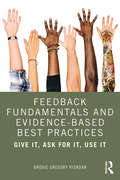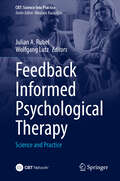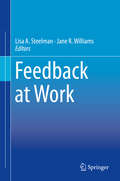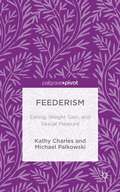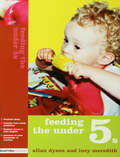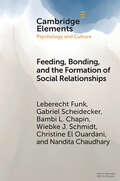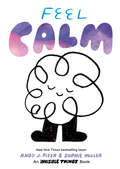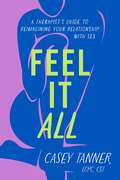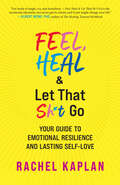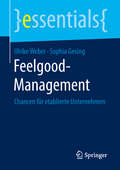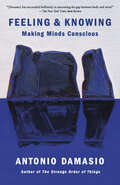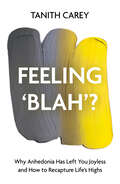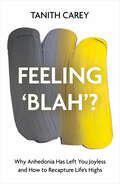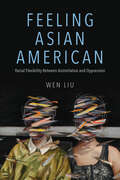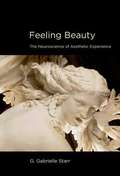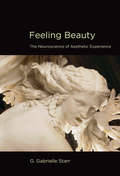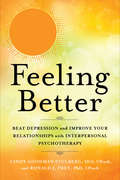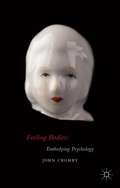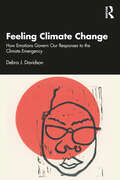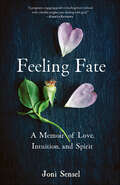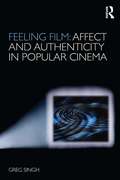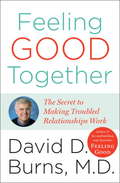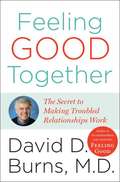- Table View
- List View
Feedback Fundamentals and Evidence-Based Best Practices: Give It, Ask for It, Use It
by Brodie Gregory RiordanFeedback is an incredibly valuable source of information – it enables us to be more self-aware and understand what we are doing well, and it tells us what we could be doing differently, more of, or less of to improve our performance and achieve our goals. Feedback Fundamentals and Evidence-Based Best Practices: Give It, Ask for It, Use It provides an essential overview of feedback fundamentals, what gets in the way of effective feedback exchanges, and the impact of technology on feedback interactions. The value of feedback is often unrealized because people dread giving it, dread receiving it, and may not know what to do with it once they get it. Feedback Fundamentals and Evidence-Based Best Practices balances research, testimonials, and practical tools to provide readers with a thorough understanding of feedback exchanges. Critical findings from decades of research in psychology, business, and other disciplines are distilled into tools and strategies that readers can easily adopt in their own lives, regardless of who they are or what they do. Throughout the book are a wealth of examples from a variety of people and situations, both within and outside traditional work contexts. Feedback Fundamentals and Evidence-Based Best Practices: Give It, Ask for It, Use It is a crucial resource for professionals, leaders, and anyone of any industry or stage in life looking to give better feedback, proactively ask for feedback, gracefully receive feedback, and put that feedback to use.
Feedback Informed Psychological Therapy: Science and Practice (CBT: Science Into Practice)
by Wolfgang Lutz Julian A. RubelThis book is a clinical guide to using routine outcome monitoring and feedback to prevent and address patient deterioration over the course of treatment. It examines the benefits of monitoring patients&’ progress and providing feedback to practitioners, a a low cost, simple intervention that improves care and reduces the number of treatment failures. Progress feedback uses standardized measures to routinely evaluate treatment progress regularly throughout treatment, and helps the practitioner decide whether adaptations in the treatment approach are necessary. Chapters include case materials and detailed descriptions of how to use different feedback systems in clinical practice. This enhances practitioner judgment regarding which system is the most appropriate for each individual case. This invaluable guide provides practitioners with ways to address treatment non-response and intervene in time before a failing situation becomes treatment failure.
Feedback at Work
by Lisa A. Steelman Jane R. WilliamsThis book delivers an evidence-based summary of best practices in providing and utilizing feedback in organizational settings. Bringing together a range of renowned experts, the chapters in this book discuss the current state of feedback theory and research, as well as practical recommendations for using the evidence to improve feedback processes in organizations. This book is intended for scholars and managers, but anyone on the giving or receiving end of feedback will benefit from a better understanding of the process. The chapters in this volume take the reader deep into the current literature, set a research agenda for the future, and provide key take-aways to enhance intentionality in the feedback process.
Feederism: Eating, Weight Gain, and Sexual Pleasure
by Kathy Charles Michael PalkowskiThis book explores the controversial and misunderstood world of sexualised weight gain known as feederism. Conversations with over 20 feeders and feedees are analysed through a psychological and sociological lens. The implications for health professionals working in bariatrics are discussed along with directions for future research.
Feeding the Under 5s
by Allan Dyson Lucy MeredithOne young child in every four is overweight and one in ten is obese, some of the reasons for this are: a general lack of interest and understanding of food and cooking junk food being consumed every day a more sedentary school life. As a key issue that needs to be tackled early, starting with the under fives, this book offers: advice and recipe ideas for feeding young children properly ways to improve young children’s understanding of food and nutrition contemporary evidence and policies recommended by expert advisory bodies underlying reasons behind nutritional guidelines and food safety advice, and practical ways to implement them. The authors present all of this in plain English without assuming any prior knowledge of nutrition, food safety or health issues.
Feeding, Bonding, and the Formation of Social Relationships: Ethnographic Challenges to Attachment Theory and Early Childhood Interventions (Elements in Psychology and Culture)
by Nandita Chaudhary Gabriel Scheidecker Leberecht Funk Bambi L. Chapin Wiebke J. Schmidt Christine El OuardaniThis Element explores multi-faceted linkages between feeding and relationship formation based on ethnographic case studies in Morocco, Madagascar, Sri Lanka, Taiwan, and Costa Rica. Research demonstrates that there are many culturally valued ways of feeding children, contradicting the idea of a single universally optimal feeding standard. It demonstrates further that in many parts of the world, feeding plays a central role in bonding and relationship formation, something largely overlooked in current developmental theories. Analysis shows that feeding contributes to relationship formation through what we call proximal, transactional, and distal dimensions. This Element argues that feeding practices can lead to qualitatively distinct forms of relationships. It has important theoretical and practical implications, calling for the expansion of attachment theory to include feeding and body-centered caregiving and significant changes to global interventions currently based on 'responsive feeding.' This title is also available as Open Access on Cambridge Core.
Feel Calm: An Invisible Things Book (Invisible Things)
by Andy J. Pizza Sophie MillerFrom the creators of the New York Times bestseller Invisible Things, this hands-on board book leads toddlers on a whimsical and reassuring journey from chaos to calm. When you feel wound up, how do you get the knots out? Follow along to unwind the tangled mess of ups, downs, and loop the loops and find the way back to calm. With this book in hand, take a moment to pause, take a deep breath, and practice mindfulness and grounding techniques perfectly suited for young readers.Invisible Things introduced the wonderful concept of exploring the invisible things that make up the human experience, encouraging us to look past the visible and connect with the things that are not seen. This inviting board book brings the idea into an interactive format, offering kids a great way to explore and take charge of their emotions.FEELINGS BOOK: Educators, therapists, and caregivers looking to have nuanced or challenging discussions with kids about their experiences can use this as a jumping-off point for conversation: What are your chaos feelings? What helps you feel calm? SOCIAL EMOTIONAL LEARNING: One common exercise teachers use is to ask kids to point to their emotions on a chart and then name them, for which this book will be a powerful tool. REVIEWED BY MENTAL HEALTH EXPERT: This book was vetted by a licensed independent clinical social worker specializing in mental health for kids. Pair it with the Invisible Things book or Invisible Things Feelings Flash Cards to create an effective home or classroom resource.POPULAR AUTHOR: Andy J. Pizza is one of the creative minds behind several children’s books, including the bestselling Invisible Things, A Pizza with Everything on It, and A Sundae with Everything on It. He also hosts the popular podcast Creative Pep Talk.Perfect for:Parents, grandparents, caregivers, teachers, and educatorsAnyone interested in social-emotional learning (SEL) and entertaining ways to explore emotions with kidsAnyone looking for interactive books about emotional health for babies and toddlersYoung readers who enjoy tactile board books like Press Here and Mix It Up!Fans of Pixar's Inside OutFans of Andy J. Pizza, the Creative Pep Talk podcast, or his bestselling books, including Invisible Things and A Pizza with Everything on It
Feel It All: A Therapist's Guide to Reimagining Your Relationship with Sex
by Casey TannerA groundbreaking guide to sexuality that dispels the stale cultural attitudes about sex that leave too many feeling inadequate, and offers an expansive, attachment-based framework to free us and develop bolder, more satisfying relationships with our sexual selves.When it comes to sex, most people feel insecure. But it’s not because we’re deficient; it’s because we’ve been under-resourced and miseducated. Certified sex therapist Casey Tanner argues that our sex lives are a microcosm of every untruth we’ve internalized about gender, sex, relationships, our bodies, and ourselves. Most of us were taught that healthy sexuality is only for a certain kind of person, in a certain kind of relationship, with a certain kind of body. As a result, the way we’ve learned how to define “good sex” is reflective of how good, worthy, and loveable we see ourselves.Feel It All is a comprehensive guide to help everyone uncover their personal misconceptions about sexuality and relationships. Tanner helps you recognize and assess your core beliefs surrounding relationships, sexuality, gender, and more; identify past trauma; find pathways to healing that work for you; and redefine sex based on knowledge and possibilities, rather than potential consequences.Comprehensive yet accessible, informative, warm, and nonjudgmental, Feel It All provides a pathway for personal healing, creating stronger relationships, and achieving deeper intimacy.
Feel, Heal, and Let That Sh*t Go: Your Guide to Emotional Resilience and Lasting Self-Love
by Rachel KaplanA game-changing approach to emotional health and well-being After suffering profound tragedy in her teens and coping by suppressing the emotions, Rachel Kaplan began a journey of study, therapy, and eventual breakthrough. She knows from experience that many of us avoid actually feeling our feelings. Instead, we store them in a kind of emotional constipation, chasing distraction, addiction, and other forms of suppression. The only way to heal and to live healthier, happier lives is to move the emotions through our bodies. Kaplan presents a revolutionary and irreverent approach to personal transformation and self-care that teaches you precisely how to feel emotions — and release them as nature intended. Doing so is the definitive means for establishing a baseline of well-being and self-trust and overcoming the debilitating effects of core wounds, chronic stress, depression, and backlogged emotional pain. By letting that sh*t go, you can enjoy the life you’re living and know your worth, no matter what.
Feelgood-Management: Chancen für etablierte Unternehmen (essentials)
by Ulrike Weber Sophia GesingDieses essential beschreibt, wie das Konzept des Feelgood-Managements auch für etablierte Unternehmen einen Mehrwert bietet. Ulrike Weber und Sophia Gesing zeigen in dem Folgeband zu „Konzept und Berufsbild des Feelgood-Managements“ die Chancen auf, mit Feelgood-Management organisatorische Agilität zu fördern. Dazu stellen die Autorinnenwerden inhaltliche Gemeinsamkeiten und Unterschiede von Feelgood-Management zu anderen Führungskonzepten wie auch die Schnittstellen und Synergien mit anderen Organisationseinheiten dargestellt. Der Band liefert einen fundierten als auch praxisorientierten Ausblick auf die Chancen von Feelgood-Management in etablierten Unternehmen.
Feeling & Knowing: Making Minds Conscious
by Antonio DamasioFrom one of the world&’s leading neuroscientists: a succinct, illuminating, wholly engaging investigation of how biology, neuroscience, psychology, and artificial intelligence have given us the tools to unlock the mysteries of human consciousness In recent decades, many philosophers and cognitive scientists have declared the problem of consciousness unsolvable, but Antonio Damasio is convinced that recent findings across multiple scientific disciplines have given us a way to understand consciousness and its significance for human life. In the forty-eight brief chapters of Feeling & Knowing, and in writing that remains faithful to our intuitive sense of what feeling and experiencing are about, Damasio helps us understand why being conscious is not the same as sensing, why nervous systems are essential for the development of feelings, and why feeling opens the way to consciousness writ large. He combines the latest discoveries in various sciences with philosophy and discusses his original research, which has transformed our understanding of the brain and human behavior. Here is an indispensable guide to understanding how we experience the world within and around us and find our place in the universe.
Feeling 'Blah'?: Why Anhedonia Has Left You Joyless and How to Recapture Life's Highs
by Tanith Carey'Fascinating' Psychologies 'A brilliant read' Happiful 'A really, really, really, really good book' Liz Jones, You magazine podcastHow much do you enjoy your life?Does life feel dull? A bit grey?Do you feel as if your emotions have flatlined?This is anhedonia – a word only a few of us have heard of but one that explains why so many of us feel we are sleepwalking through life.Anhedonia is from the Greek word for 'without pleasure' and describes a loss of interest in activities you once enjoyed. It explains why many of us spend our lives in a fog, feeling neither happy nor sad, just not very much at all.In the first book to tackle this missing piece in mental health, writer Tanith Carey joins the dots on how convenience culture, stressful lifestyles, modern diets and both female and male hormonal changes can dial down our ability to feel excitement and joy.With the help of world-leading experts and by digging into the latest research, Tanith shows you how your brain's dopamine reward system works and provides strategies to help you bring colour back into your life.Groundbreaking, accessible and often surprising, this is the book that will teach you how to kickstart your feel-good chemicals and start loving life again.
Feeling 'Blah'?: Why Anhedonia Has Left You Joyless and How to Recapture Life's Highs
by Tanith Carey'Fascinating' Psychologies'A brilliant read' Happiful'A really, really, really, really good book' Liz Jones, You magazine podcast How much do you enjoy your life? Does life feel dull? A bit grey? Do you feel as if your emotions have flatlined? This is anhedonia – a word only a few of us have heard of but one that explains why so many of us feel we are sleepwalking through life. Anhedonia is from the Greek word for 'without pleasure' and describes a loss of interest in activities you once enjoyed. It explains why many of us spend our lives in a fog, feeling neither happy nor sad, just not very much at all. In the first book to tackle this missing piece in mental health, writer Tanith Carey joins the dots on how convenience culture, stressful lifestyles, modern diets and both female and male hormonal changes can dial down our ability to feel excitement and joy. With the help of world-leading experts and by digging into the latest research, Tanith shows you how your brain's dopamine reward system works and provides strategies to help you bring colour back into your life. Groundbreaking, accessible and often surprising, this is the book that will teach you how to kickstart your feel-good chemicals and start loving life again.
Feeling 'Blah'?: Why Anhedonia Has Left You Joyless and How to Recapture Life's Highs
by Tanith Carey'Fascinating' Psychologies'A brilliant read' Happiful'A really, really, really, really good book' Liz Jones, You magazine podcast How much do you enjoy your life? Does life feel dull? A bit grey? Do you feel as if your emotions have flatlined? This is anhedonia – a word only a few of us have heard of but one that explains why so many of us feel we are sleepwalking through life. Anhedonia is from the Greek word for 'without pleasure' and describes a loss of interest in activities you once enjoyed. It explains why many of us spend our lives in a fog, feeling neither happy nor sad, just not very much at all. In the first book to tackle this missing piece in mental health, writer Tanith Carey joins the dots on how convenience culture, stressful lifestyles, modern diets and both female and male hormonal changes can dial down our ability to feel excitement and joy. With the help of world-leading experts and by digging into the latest research, Tanith shows you how your brain's dopamine reward system works and provides strategies to help you bring colour back into your life. Groundbreaking, accessible and often surprising, this is the book that will teach you how to kickstart your feel-good chemicals and start loving life again.
Feeling Asian American: Racial Flexibility Between Assimilation and Oppression (NWSA / UIP First Book Prize)
by Wen LiuAsian Americans have become the love-hate subject of the American psyche: at times celebrated as the model minority, at other times hated as foreigners. Wen Liu examines contemporary Asian American identity formation while placing it within a historical and ongoing narrative of racial injury. The flexible racial status of Asian Americans oscillates between oppression by the white majority and offers to assimilate into its ranks. Identity emerges from the tensions produced between those two poles. Liu dismisses the idea of Asian Americans as a coherent racial population. Instead, she examines them as a raced, gendered, classed, and sexualized group producing varying physical and imaginary boundaries of nation, geography, and citizenship. Her analysis reveals repeated norms and acts that capture Asian Americanness as part of a racial imagination that buttresses capitalism, white supremacy, neoliberalism, and the US empire. An innovative challenge to persistent myths, Feeling Asian American ranges from the wartime origins of Asian American psychology to anti-Asian attacks to present Asian Americanness as a complex political assemblage.
Feeling Beauty
by G. Gabrielle StarrIn Feeling Beauty, G. Gabrielle Starr argues that understanding the neural underpinnings of aesthetic experience can reshape our conceptions of aesthetics and the arts. Drawing on the tools of both cognitive neuroscience and traditional humanist inquiry, Starr shows that neuroaesthetics offers a new model for understanding the dynamic and changing features of aesthetic life, the relationships among the arts, and how individual differences in aesthetic judgment shape the varieties of aesthetic experience. Starr, a scholar of the humanities and a researcher in the neuroscience of aesthetics, proposes that aesthetic experience relies on a distributed neural architecture -- a set of brain areas involved in emotion, perception, imagery, memory, and language. More important, it emerges from networked interactions, intricately connected and coordinated brain systems that together form a flexible architecture enabling us to develop new arts and to see the world around us differently. Focusing on the "sister arts" of poetry, painting, and music, Starr builds and tests a neural model of aesthetic experience valid across all the arts. Asking why works that address different senses using different means seem to produce the same set of feelings, she examines particular works of art in a range of media, including a poem by Keats, a painting by van Gogh, a sculpture by Bernini, and Beethoven's Diabelli Variations. Starr's innovative, interdisciplinary analysis is true to the complexities of both the physical instantiation of aesthetics and the realities of artistic representation.
Feeling Beauty: The Neuroscience of Aesthetic Experience
by G. Gabrielle StarrA theory of the neural bases of aesthetic experience across the arts, which draws on the tools of both cognitive neuroscience and traditional humanist inquiry.In Feeling Beauty, G. Gabrielle Starr argues that understanding the neural underpinnings of aesthetic experience can reshape our conceptions of aesthetics and the arts. Drawing on the tools of both cognitive neuroscience and traditional humanist inquiry, Starr shows that neuroaesthetics offers a new model for understanding the dynamic and changing features of aesthetic life, the relationships among the arts, and how individual differences in aesthetic judgment shape the varieties of aesthetic experience. Starr, a scholar of the humanities and a researcher in the neuroscience of aesthetics, proposes that aesthetic experience relies on a distributed neural architecture—a set of brain areas involved in emotion, perception, imagery, memory, and language. More important, it emerges from networked interactions, intricately connected and coordinated brain systems that together form a flexible architecture enabling us to develop new arts and to see the world around us differently. Focusing on the "sister arts" of poetry, painting, and music, Starr builds and tests a neural model of aesthetic experience valid across all the arts. Asking why works that address different senses using different means seem to produce the same set of feelings, she examines particular works of art in a range of media, including a poem by Keats, a painting by van Gogh, a sculpture by Bernini, and Beethoven's Diabelli Variations. Starr's innovative, interdisciplinary analysis is true to the complexities of both the physical instantiation of aesthetics and the realities of artistic representation.
Feeling Better: A Kid's Book About Therapy
by Rachel RashkinAs life gets more complicated, it's not unusual for children to feel angry, lonely, upset, and sad. In their confusion, some kids may withdraw socially, perform less well in school, care less about their appearance, lose interest in the activities they once enjoyed, develop eating problems, sleep too much or not enough, express anger inappropriately--any number of changes that may signal the need for some extra help. When these feelings become too strong or last too long, one of the things that can help is therapy. Feeling Better is an information packed chronicle that will reassure children who are entering therapy by answering their concerns about what's normal and what to expect.
Feeling Better: Beat Depression and Improve Your Relationships with Interpersonal Psychotherapy
by Cindy Goodman Stulberg Ronald J. FreyBeat Depression and Improve Your Relationships When it comes to treatment for depression, we have been getting it all wrong. Instead of focusing on just the biochemistry, we need to focus on the importance of relationships. Feeling Better offers a step-by-step guide using a research-proven approach called interpersonal psychotherapy, or IPT, which can help you deal with the issues that may be contributing to your unhappiness. Therapists Cindy Stulberg and Ron Frey have used IPT with clients for more than twenty years and achieved dramatic, lasting results after only eight to twelve weeks. They have now created this accessible, first-of-its kind guide. Feeling Better teaches skills and tools that will allow you to set and achieve goals, articulate feelings, and make constructive decisions. You’ll learn to identify and engage with allies and supporters, deal with difficult people, and, if need be, walk away from harmful relationships. Cindy and Ron have taught clients — diagnosed with depression or not — to use these skills in virtually every life situation, from preventing divorce to “consciously uncoupling,” raising healthy children, coping with loss, and dealing with addiction. Writing with wisdom, warmth, and humor, they are savvy coaches and inspiring cheerleaders who can offer a lifeline to the depressed and life enrichment to anyone.
Feeling Climate Change: How Emotions Govern Our Responses to the Climate Emergency
by Debra J. DavidsonExamining the social response to the mounting impacts of climate change, Feeling Climate Change illuminates what the pathways from emotions to social change look like—and how they work—so we can recognize and inform our collective attempts to avert further climate catastrophe.Debra J. Davidson engages with how our actions are governed by a complex of rules, norms, and predispositions, central among which operates our emotionality, to assess individual and collective responses to the climate crisis, applying a critical and constructive analysis of human social prospects for confronting the climate emergency in manners that minimize the damage and perhaps even enhance the prospects for meaningful collective living.Providing a crucial understanding of our emotionality and its role in individual behaviour, collective action, and ultimately in social change, this book offers researchers, policymakers, and citizens essential insights into our personal and collective responses to the climate emergency.
Feeling Fate: A Memoir of Love, Intuition, and Spirit
by Joni SenselAs her sweetheart’s body lies cooling on the living room floor, Joni Sensel—shattered but not surprised—revisits her premonition about this moment. From nearly the start of their fairy tale romance less than four years ago, she knew she would lose Tony, the man she considered to be her soul mate. He was in great health, but fate had other plans—a hard truth that visited Joni in the form of a startling vision during their second weekend together. Though she kept the premonition a secret while Tony was alive, upon his death she’s compelled to share it with his spirit in the form of a letter. A grief memoir with a paranormal twist, Feeling Fate explores how a dark intuition magnified Sensel’s love and gratitude in the time she and Tony had together before her premonition came true. Faced with evidence of a grand design alongside her grief, she’s torn between faith and skepticism. While she’s nearly undone by the pain of her loss, she eventually discovers that a sassy imagination and the irrational insights of the heart can both defeat despair and transform her grief into meaning.
Feeling Film: Affect And Authenticity In Popular Cinema
by Greg SinghCinema has the capacity to enflame our passions, to arouse our pity, to inspire our love. Feeling Film is a book that examines the emotional encounters found in contemporary popular cinema cultures. Examining melodrama, film noir, comic book franchises, cult indie movies and romantic comedy within the context of a Jungian-informed psychology and contemporary movements in film-philosophy, this book considers the various kinds of feelings engendered by our everyday engagements with cinema. Greg Singh questions the popular idea of what cinema is, and considers what happens during the anticipation and act of watching a movie, through to the act of sharing our feelings about them, the reviewing process and repeat-viewing practices. Feeling Film does this through a critique of purely textual approaches, instead offering a model which emphasises lived, warm (embodied and inhabited) psychological relationships between the viewer and the viewed. It extends the narrative action of cinema beyond the duration of the screening into realms of anticipation and afterlife, in particular providing insight into the tertiary and participatory practices afforded through rich media engagement. In rethinking the everyday, co-productive relationship between viewer and viewed from this perspective, Feeling Film reinstates the importance of feelings as a central concern for film theory. What emerges from this study is a re-engagement of the place of emotion, affect and feeling in film theory and criticism. In reconsidering the duration of the cinematic encounter, Feeling Film makes a significant contribution to the understanding of the inter-subjective relationship between viewer and viewed. It takes post-Jungian criticism into the realms of post-cinema technologies and reignites the dialogue between depth psychology and the study of images as they appear to, and for, us. This book will make essential reading for those interested in the relationship between film and aspects of depth psychology, film and philosophy students at advanced undergraduate and postgraduate levels, film and cinema academics and cinephiles.
Feeling Good Together
by David D. BurnsWe all know people who are hard to get along with. It might be your spouse, mother, neighbor, friend, or colleague. In his new book Feeling Good Together, Dr. David D. Burns describes Cognitive Interpersonal Therapy (CIT), a radically different method for developing more loving and satisfying relationships with the people you care about. Based on twenty-five years of clinical experience and new, groundbreaking research involving more than 1,000 individuals, Feeling Good Together is filled with helpful examples and tools, such as the Relationship Satisfaction Test, the Blame Cost-Benefit Analysis, the Relationship Journal, Five Secrets of Effective Communication, the Intimacy Exercise, and more. Using these techniques, Dr. Burns shows you how to resolve virtually any kind of relationship conflict almost instantly.
Feeling Good Together: The Secret Of Making Troubled Relationships Work
by David D. BurnsCognitive Interpersonal Therapy (CIT) is a radically different method for developing more loving and satisfying relationships. In his latest work, Dr. Burns shows how to resolve virtually any kind of relationship conflict almost instantly by utilizing this method.
